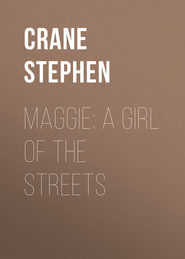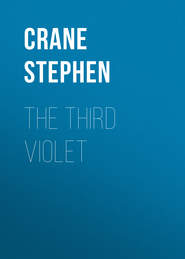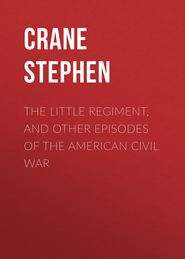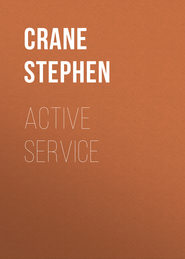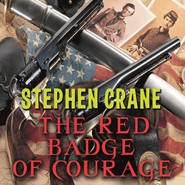По всем вопросам обращайтесь на: info@litportal.ru
(©) 2003-2025.
✖
The Red Badge of Courage: An Episode of the American Civil War
Настройки чтения
Размер шрифта
Высота строк
Поля
All about them were other small fires surrounded by men with their little black utensils. From one of these near came sudden sharp voices in a row. It appeared that two light-footed soldiers had been teasing a huge, bearded man, causing him to spill coffee upon his blue knees. The man had gone into a rage and had sworn comprehensively. Stung by his language, his tormentors had immediately bristled at him with a great show of resenting unjust oaths. Possibly there was going to be a fight.
The friend arose and went over to them, making pacific motions with his arms. "Oh, here, now, boys, what's th' use?" he said. "We'll be at th' rebs in less'n an hour. What's th' good fightin' 'mong ourselves?"
One of the light-footed soldiers turned upon him red-faced and violent. "Yeh needn't come around here with yer preachin'. I s'pose yeh don't approve 'a fightin' since Charley Morgan licked yeh; but I don't see what business this here is 'a yours or anybody else."
"Well, it ain't," said the friend mildly. "Still I hate t' see–"
There was a tangled argument.
"Well, he–," said the two, indicating their opponent with accusative forefingers.
The huge soldier was quite purple with rage. He pointed at the two soldiers with his great hand, extended clawlike. "Well, they–"
But during this argumentative time the desire to deal blows seemed to pass, although they said much to each other. Finally the friend returned to his old seat. In a short while the three antagonists could be seen together in an amiable bunch.
"Jimmie Rogers ses I'll have t' fight him after th' battle t'-day," announced the friend as he again seated himself. "He ses he don't allow no interferin' in his business. I hate t' see th' boys fightin' 'mong themselves."
The youth laughed. "Yer changed a good bit. Yeh ain't at all like yeh was. I remember when you an' that Irish feller–" He stopped and laughed again.
"No, I didn't use t' be that way," said his friend thoughtfully. "That's true 'nough."
"Well, I didn't mean–" began the youth.
The friend made another deprecatory gesture. "Oh, yeh needn't mind, Henry."
There was another little pause.
"Th' reg'ment lost over half th' men yestirday," remarked the friend eventually. "I thought 'a course they was all dead, but, laws, they kep' a-comin' back last night until it seems, after all, we didn't lose but a few. They'd been scattered all over, wanderin' around in th' woods, fightin' with other reg'ments, an' everything. Jest like you done."
"So?" said the youth.
Chapter 15
The regiment was standing at order arms at the side of a lane, waiting for the command to march, when suddenly the youth remembered the little packet enwrapped in a faded yellow envelope which the loud young soldier with lugubrious words had intrusted to him. It made him start. He uttered an exclamation and turned toward his comrade.
"Wilson!"
"What?"
His friend, at his side in the ranks, was thoughtfully staring down the road. From some cause his expression was at that moment very meek. The youth, regarding him with sidelong glances, felt impelled to change his purpose. "Oh, nothing," he said.
His friend turned his head in some surprise, "Why, what was yeh goin' t' say?"
"Oh, nothing," repeated the youth.
He resolved not to deal the little blow. It was sufficient that the fact made him glad. It was not necessary to knock his friend on the head with the misguided packet.
He had been possessed of much fear of his friend, for he saw how easily questionings could make holes in his feelings. Lately, he had assured himself that the altered comrade would not tantalize him with a persistent curiosity, but he felt certain that during the first period of leisure his friend would ask him to relate his adventures of the previous day.
He now rejoiced in the possession of a small weapon with which he could prostrate his comrade at the first signs of a cross-examination. He was master. It would now be he who could laugh and shoot the shafts of derision.
The friend had, in a weak hour, spoken with sobs of his own death. He had delivered a melancholy oration previous to his funeral, and had doubtless in the packet of letters, presented various keepsakes to relatives. But he had not died, and thus he had delivered himself into the hands of the youth.
The latter felt immensely superior to his friend, but he inclined to condescension. He adopted toward him an air of patronizing good humor.
His self-pride was now entirely restored. In the shade of its flourishing growth he stood with braced and self-confident legs, and since nothing could now be discovered he did not shrink from an encounter with the eyes of judges, and allowed no thoughts of his own to keep him from an attitude of manfulness. He had performed his mistakes in the dark, so he was still a man.
Indeed, when he remembered his fortunes of yesterday, and looked at them from a distance he began to see something fine there. He had license to be pompous and veteranlike.
His panting agonies of the past he put out of his sight.
In the present, he declared to himself that it was only the doomed and the damned who roared with sincerity at circumstance. Few but they ever did it. A man with a full stomach and the respect of his fellows had no business to scold about anything that he might think to be wrong in the ways of the universe, or even with the ways of society. Let the unfortunates rail; the others may play marbles.
He did not give a great deal of thought to these battles that lay directly before him. It was not essential that he should plan his ways in regard to them. He had been taught that many obligations of a life were easily avoided. The lessons of yesterday had been that retribution was a laggard and blind. With these facts before him he did not deem it necessary that he should become feverish over the possibilities of the ensuing twenty-four hours. He could leave much to chance. Besides, a faith in himself had secretly blossomed. There was a little flower of confidence growing within him. He was now a man of experience. He had been out among the dragons, he said, and he assured himself that they were not so hideous as he had imagined them. Also, they were inaccurate; they did not sting with precision. A stout heart often defied, and defying, escaped.
And, furthermore, how could they kill him who was the chosen of gods and doomed to greatness?
He remembered how some of the men had run from the battle. As he recalled their terror-struck faces he felt a scorn for them. They had surely been more fleet and more wild than was absolutely necessary. They were weak mortals. As for himself, he had fled with discretion and dignity.
He was aroused from this reverie by his friend, who, having hitched about nervously and blinked at the trees for a time, suddenly coughed in an introductory way, and spoke.
"Fleming!"
"What?"
The friend put his hand up to his mouth and coughed again. He fidgeted in his jacket.
"Well," he gulped at last, "I guess yeh might as well give me back them letters." Dark, prickling blood had flushed into his cheeks and brow.
"All right, Wilson," said the youth. He loosened two buttons of his coat, thrust in his hand, and brought forth the packet. As he extended it to his friend the latter's face was turned from him.
He had been slow in the act of producing the packet because during it he had been trying to invent a remarkable comment on the affair. He could conjure up nothing of sufficient point. He was compelled to allow his friend to escape unmolested with his packet. And for this he took unto himself considerable credit. It was a generous thing.
His friend at his side seemed suffering great shame. As he contemplated him, the youth felt his heart grow more strong and stout. He had never been compelled to blush in such manner for his acts; he was an individual of extraordinary virtues.
He reflected, with condescending pity: "Too bad! Too bad! The poor devil, it makes him feel tough!"
After this incident, and as he reviewed the battle pictures he had seen, he felt quite competent to return home and make the hearts of the people glow with stories of war. He could see himself in a room of warm tints telling tales to listener. He could exhibit laurels. They were insignificant; still, in a district where laurels were infrequent, they might shine.
He saw his gaping audience picturing him as the central figure in blazing scenes. And he imagined the consternation and the ejaculations of his mother and the young lady at the seminary as they drank his recitals. Their vague feminine formula for beloved ones doing brave deeds on the field of battle without risk of life would be destroyed.
Chapter 16
A sputtering of musketry was always to be heard. Later, the cannon had entered the dispute. In the fog-filled air their voices made a thudding sound. The reverberations were continual. This part of the world led a strange, battleful existence.
The youth's regiment was marched to relieve a command that had lain long in some damp trenches. The men took positions behind a curving line of rifle pits that had been turned up, like a large furrow, along the line of woods. Before them was a level stretch, peopled with short, deformed stumps. From the woods beyond came the dull popping of the skirmishers and pickets, firing in the fog. From the right came the noise of a terrific fracas.
The men cuddled behind the small embankment and sat in easy attitudes awaiting their turn. Many had their backs to the firing. The youth's friend lay down, buried his face in his arms, and almost instantly, it seemed, he was in a deep sleep.
The friend arose and went over to them, making pacific motions with his arms. "Oh, here, now, boys, what's th' use?" he said. "We'll be at th' rebs in less'n an hour. What's th' good fightin' 'mong ourselves?"
One of the light-footed soldiers turned upon him red-faced and violent. "Yeh needn't come around here with yer preachin'. I s'pose yeh don't approve 'a fightin' since Charley Morgan licked yeh; but I don't see what business this here is 'a yours or anybody else."
"Well, it ain't," said the friend mildly. "Still I hate t' see–"
There was a tangled argument.
"Well, he–," said the two, indicating their opponent with accusative forefingers.
The huge soldier was quite purple with rage. He pointed at the two soldiers with his great hand, extended clawlike. "Well, they–"
But during this argumentative time the desire to deal blows seemed to pass, although they said much to each other. Finally the friend returned to his old seat. In a short while the three antagonists could be seen together in an amiable bunch.
"Jimmie Rogers ses I'll have t' fight him after th' battle t'-day," announced the friend as he again seated himself. "He ses he don't allow no interferin' in his business. I hate t' see th' boys fightin' 'mong themselves."
The youth laughed. "Yer changed a good bit. Yeh ain't at all like yeh was. I remember when you an' that Irish feller–" He stopped and laughed again.
"No, I didn't use t' be that way," said his friend thoughtfully. "That's true 'nough."
"Well, I didn't mean–" began the youth.
The friend made another deprecatory gesture. "Oh, yeh needn't mind, Henry."
There was another little pause.
"Th' reg'ment lost over half th' men yestirday," remarked the friend eventually. "I thought 'a course they was all dead, but, laws, they kep' a-comin' back last night until it seems, after all, we didn't lose but a few. They'd been scattered all over, wanderin' around in th' woods, fightin' with other reg'ments, an' everything. Jest like you done."
"So?" said the youth.
Chapter 15
The regiment was standing at order arms at the side of a lane, waiting for the command to march, when suddenly the youth remembered the little packet enwrapped in a faded yellow envelope which the loud young soldier with lugubrious words had intrusted to him. It made him start. He uttered an exclamation and turned toward his comrade.
"Wilson!"
"What?"
His friend, at his side in the ranks, was thoughtfully staring down the road. From some cause his expression was at that moment very meek. The youth, regarding him with sidelong glances, felt impelled to change his purpose. "Oh, nothing," he said.
His friend turned his head in some surprise, "Why, what was yeh goin' t' say?"
"Oh, nothing," repeated the youth.
He resolved not to deal the little blow. It was sufficient that the fact made him glad. It was not necessary to knock his friend on the head with the misguided packet.
He had been possessed of much fear of his friend, for he saw how easily questionings could make holes in his feelings. Lately, he had assured himself that the altered comrade would not tantalize him with a persistent curiosity, but he felt certain that during the first period of leisure his friend would ask him to relate his adventures of the previous day.
He now rejoiced in the possession of a small weapon with which he could prostrate his comrade at the first signs of a cross-examination. He was master. It would now be he who could laugh and shoot the shafts of derision.
The friend had, in a weak hour, spoken with sobs of his own death. He had delivered a melancholy oration previous to his funeral, and had doubtless in the packet of letters, presented various keepsakes to relatives. But he had not died, and thus he had delivered himself into the hands of the youth.
The latter felt immensely superior to his friend, but he inclined to condescension. He adopted toward him an air of patronizing good humor.
His self-pride was now entirely restored. In the shade of its flourishing growth he stood with braced and self-confident legs, and since nothing could now be discovered he did not shrink from an encounter with the eyes of judges, and allowed no thoughts of his own to keep him from an attitude of manfulness. He had performed his mistakes in the dark, so he was still a man.
Indeed, when he remembered his fortunes of yesterday, and looked at them from a distance he began to see something fine there. He had license to be pompous and veteranlike.
His panting agonies of the past he put out of his sight.
In the present, he declared to himself that it was only the doomed and the damned who roared with sincerity at circumstance. Few but they ever did it. A man with a full stomach and the respect of his fellows had no business to scold about anything that he might think to be wrong in the ways of the universe, or even with the ways of society. Let the unfortunates rail; the others may play marbles.
He did not give a great deal of thought to these battles that lay directly before him. It was not essential that he should plan his ways in regard to them. He had been taught that many obligations of a life were easily avoided. The lessons of yesterday had been that retribution was a laggard and blind. With these facts before him he did not deem it necessary that he should become feverish over the possibilities of the ensuing twenty-four hours. He could leave much to chance. Besides, a faith in himself had secretly blossomed. There was a little flower of confidence growing within him. He was now a man of experience. He had been out among the dragons, he said, and he assured himself that they were not so hideous as he had imagined them. Also, they were inaccurate; they did not sting with precision. A stout heart often defied, and defying, escaped.
And, furthermore, how could they kill him who was the chosen of gods and doomed to greatness?
He remembered how some of the men had run from the battle. As he recalled their terror-struck faces he felt a scorn for them. They had surely been more fleet and more wild than was absolutely necessary. They were weak mortals. As for himself, he had fled with discretion and dignity.
He was aroused from this reverie by his friend, who, having hitched about nervously and blinked at the trees for a time, suddenly coughed in an introductory way, and spoke.
"Fleming!"
"What?"
The friend put his hand up to his mouth and coughed again. He fidgeted in his jacket.
"Well," he gulped at last, "I guess yeh might as well give me back them letters." Dark, prickling blood had flushed into his cheeks and brow.
"All right, Wilson," said the youth. He loosened two buttons of his coat, thrust in his hand, and brought forth the packet. As he extended it to his friend the latter's face was turned from him.
He had been slow in the act of producing the packet because during it he had been trying to invent a remarkable comment on the affair. He could conjure up nothing of sufficient point. He was compelled to allow his friend to escape unmolested with his packet. And for this he took unto himself considerable credit. It was a generous thing.
His friend at his side seemed suffering great shame. As he contemplated him, the youth felt his heart grow more strong and stout. He had never been compelled to blush in such manner for his acts; he was an individual of extraordinary virtues.
He reflected, with condescending pity: "Too bad! Too bad! The poor devil, it makes him feel tough!"
After this incident, and as he reviewed the battle pictures he had seen, he felt quite competent to return home and make the hearts of the people glow with stories of war. He could see himself in a room of warm tints telling tales to listener. He could exhibit laurels. They were insignificant; still, in a district where laurels were infrequent, they might shine.
He saw his gaping audience picturing him as the central figure in blazing scenes. And he imagined the consternation and the ejaculations of his mother and the young lady at the seminary as they drank his recitals. Their vague feminine formula for beloved ones doing brave deeds on the field of battle without risk of life would be destroyed.
Chapter 16
A sputtering of musketry was always to be heard. Later, the cannon had entered the dispute. In the fog-filled air their voices made a thudding sound. The reverberations were continual. This part of the world led a strange, battleful existence.
The youth's regiment was marched to relieve a command that had lain long in some damp trenches. The men took positions behind a curving line of rifle pits that had been turned up, like a large furrow, along the line of woods. Before them was a level stretch, peopled with short, deformed stumps. From the woods beyond came the dull popping of the skirmishers and pickets, firing in the fog. From the right came the noise of a terrific fracas.
The men cuddled behind the small embankment and sat in easy attitudes awaiting their turn. Many had their backs to the firing. The youth's friend lay down, buried his face in his arms, and almost instantly, it seemed, he was in a deep sleep.






